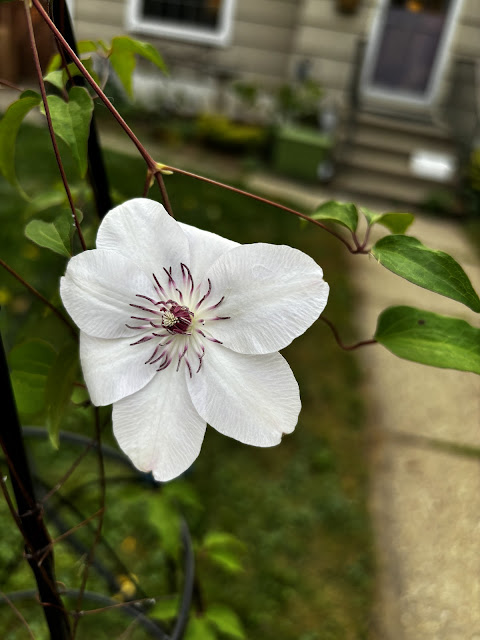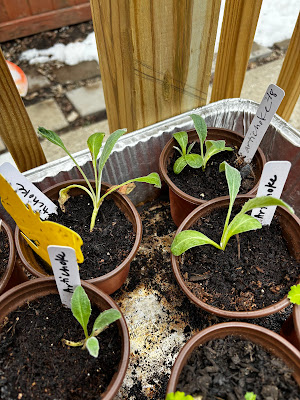2.01.2025
A Wasp in January????!!!!
1.29.2025
Onions & Leek Seed Starting
1.27.2025
Seed Starting This Week Zone 5
Oh, I am so excited!!
This week is the week to start certain seeds in Zone 5. I have onions, leeks, artichokes, and a packet of perennial flowers.
A few things to note:
Onion family needs to start early because they need as much heat and sun to grow - peppers also need to be started early because they also like the heat and sun. Peppers can get big fairly quickly though so I tend to start those only a week or two before tomatoes. Nightshades in general are heatloving and will need heat mats to start unless in a room that's already fairly warm.
Onions - I will put 15 - 20 seeds into each cell, then spread apart a little when up-potted to 3 inch pots, then separate when I plant them in the ground in late April/May
Leeks - same as above
Artichokes - 1 seed per cell. Last year I planted 6 plants, 6 survived - 3 produced flower heads and I let all 3 bloom. THEY WERE GORGEOUS. This year I want to plant them in my front yard that gets direct sun for 12 hours to simulate their native region. I'm planning on planting out the rest of the packet, so approximately 15 seeds to start.
Packet of perennial flowers - received from MN Dept of Ag. Claims to be all native perennials, however, when reading the varieties that are included I have dealt with 3 in my yard that became invasive and wanted to take over. I will do 1 seed per cell to separate out what I don't want in my yard. Those plants will go to the hill at the school garden where they can take over and hopefully choke out Canada thistle and the weird non-native grasses.
12.28.2024
Winter Weather
So far we've had a fairly mild winter but we did have a white Christmas which my kids were super excited about - though it was WARM and I was able to walk the dog for over an hour (and I got hot!). It's even rained over the last day.
However, last year we changed into Zone 5a instead of Zone 4. This is dependent upon our lowest average temperature. Zone 4 is designated down to -30 while Zone 5 is designated down to -20.
I find this to be true in the past few years. Taking the Master Gardener course we got to see many different science tables that have taken data from over the 30-75 years to look at weather patterns. Our area has consistently been warmer and I won't be surprised if in the next 5 years, the whole of southern Minnesota will be Zone 5.
There are positives for gardeners - we can grow new plants like lavender and fig trees. But the negatives are pretty swift - insects and bugs that we have not seen before in our area, algae, new plant diseases, bacterias, viruses, plants not being able to survive the warmer weather. But I don't think the general public sees warmer weather as a bad thing - especially here in the upper Midwest where we have cold weather and it can be pretty harsh. So ah, you know, dumpster fire for the Earth.
Hopefully people will care and we can repair some of the damage that has been done. I'm hopeful.
10.21.2024
Fall into... Fall??
Wow. Now that my year is coming to a close... I really haven't updated this much at all! This year I've really been more of a "doom scroller" but watching all the gardening and cleaning videos. I haven't been making many of my own. Mostly that's because I was SO BUSY THIS YEAR.
I did the U of MN Extension Master Gardener course. I volunteered 50 hours - in elementary schools, at info booths, at a plant sale, farmer's markets. It was so much fun! And not only did I do the whole course, I also ended up doing an extra 12 hours of continuing education - mostly regarding vegetable gardening and also teaching grades K-5 gardening and plant science. It was really fun and I'm so happy that I applied and was accepted. I really enjoy volunteering in the garden world and I have really loved meeting so many other garden nerds like myself.
So now that the hard part is over and I'm not constantly reading about biology, pesticides, how-to grow books, and identifying problems, I'm so ready to get back to sharing what I'm doing! I'm usually good about sharing Stories on Instagram but I've noticed people migrating over to TikTok and I'm not sure I can get myself over there. At 41, I'm feeling like I still belong on my blog and on Instagram.. LOL
So stay tuned. I'm going to start planning my garden for next year with a whole new breadth of knowledge and I will be so happy to share!
9.09.2024
End of Summer
Wow, boy did I ever forget about this thing.
Actually, this year has been incredibly busy and the U of M's Master Gardener program took me a long time to fulfill all the requirements. I wasn't exactly in top blogging mode but alas, I'm not sure who blogs anymore when there's Instagram and TikTok. Apparently only the Xennials. HA.
This summer was an odd one. We had a very chilly and rainy start to the season - which meant that it took the pollinators a heck of a lot longer to wake from their slumber or make their way up from Mexico. Their trip from Mexico was thwarted by rains and cooler temps, which means that they weren't active or leaving their Mexico wintering spots (there's three main locations). By August my flowers are filled with caterpillars and butterflies but the Monarchs just started showing up in the past week. There were 10 on one of my liatris yesterday. It's fun to see! I didn't get a good look at their body sizes - usually a bigger body means the last generation before they make the flight to Mexico. Because they are so late this year, their journey may be cut short - and hopefully they'll have the instincts to turn back soon before the winter hits.
The cooler weather also meant that my peppers didn't fully grow and mature - I have only two plants that were able to make it through to the warmer July and August. I harvested maybe 7 jalepenos before a trip to Cuyuna. I saw there's about 7 more. I'll chop and freeze those for chili this winter. This year's peppers were so unlike last year - last year I had peppers coming out of my ears and couldn't use them fast enough.
This year my high achievers were: cucumbers, finally (after rabbit fencing) 3 lacinato kale plants, the potatoes came back with around 80 total potatoes (so about 8-10 meals), and Sungold tomatoes. My Mr. Stripeys are also doing great after a week of cool night temps, they taste pretty delish and I will grow again.
I also grew artichokes this year - 3 are blooming. Next year I'm going to move those down to the street for passersby to see. The artichokes are members of the thistle family and I quickly realized that they don't mind if you forget about them. They're bred to grow in the northern climate so I'm hoping they bloom through September. These are also added to the list to grow again.
We started getting cool temperatures at night a few weeks ago. The cooler temps will ripen tomatoes but also tell your squash plants that it's time to be done. Your peppers will start turning red and orange if you haven't harvested them yet. Basil and maybe your second succession of cilantro is probably bolting. The weather is indicating that it's a season change.
Happy September!
4.24.2024
Spring Hardening Off
4.05.2024
Spring Seedlings - Artichokes
3.27.2024
Gophers Win!
2.16.2024
2024 is the Year of the Garden
Last fall I toyed with the idea of going back to school and when the deadline for applying for a certificate class came around... I submitted my application and decided that if I was accepted I would see how my brain would do with learning how to re-learn!
So far.... so good!
I'm doing the certified Volunteer Master Gardener program and it is AMAZING. The amount of information is A LOT and the learning doesn't stop. I've done several webinars to continue learning on topics that I had no idea about - like commercial flower farming, pesticide use on agricultural land, and Integrated Pest Management. It's all fascinating. Last week I had a pollinator webinar and learned how to identify and distinguish bees from beneficial flies (their wings, you look at their wings!).
And now we're onto learning best practices for fruits and vegetable growing.
We've been told we'll get the most questions at the State Fair and the Home & Garden show about tomatoes, apples, and pest management so I'm trying to arm myself best as possible!
I'm also using all this knowledge to push myself to volunteering at more elementary schools to check out other school gardens to see what is possible. At some point, I would like to get together with the middle school science teachers in my school district to see if a single raised bed would be possible and build from there. I have learned with the school garden that I run - you can't jump in fully without testing the waters first, it's not a good thing to be completely overwhelmed running a garden if you don't have the volunteers and support you need. It's like how I would love to work with high schoolers to give them the experience to put on their resumes, but first I need to know how many volunteers I need, build a guide for directions, etc... You can't just garden without a plan. So that's another part of my learning!
I've received so many AWESOME book recommendations and they're reference books so they're HUGE. I really have forgotten what it's like to continuously be looking up information and research questions - in the world of horticulture you can find many experts but I've learned to ask to be introduced to THE EXPERT of an insect, animal, or plant instead of just asking a random Horticulturalist or Entomologist. I KNOW.





























